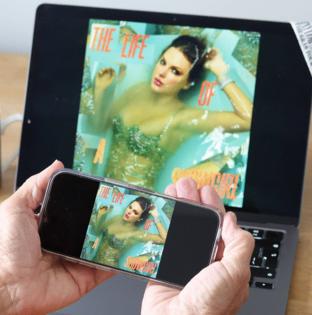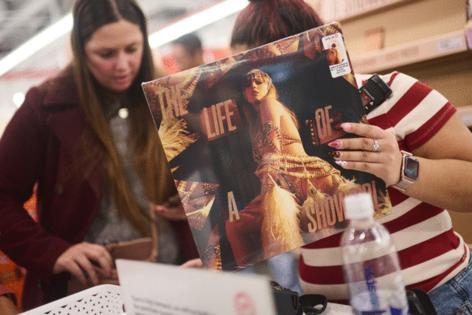Review: Taylor Swift's 'The Life of a Showgirl' is an immaculate act of damage control
Published in Entertainment News
After the mess, the mop-up.
That's one way to understand Taylor Swift's new album, "The Life of a Showgirl," on which music's biggest star offers up a dozen precision-cut pop songs just 18 months removed from last year's sprawling and emotionally unstable "The Tortured Poets Department."
That earlier LP, which contained 16 tracks before Swift expanded it with 15 more, was perhaps the most divisive of the singer's two-decade-long career; it racked up bonkers sales and streaming numbers, of course — at this point, she's truly too big to fail — but its mixed reception among tastemakers and even some fans seemed to rattle Swift, who for all her alertness to the brutality of being a woman in the public eye has become accustomed to a certain level of idolatry.
So here's "Showgirl," her 12th studio LP, for which she stepped away from her longtime creative partner Jack Antonoff to reteam with Max Martin and Shellback, the two hit-making Swedish producer-songwriters who helped her transition cleanly from country to pop in the mid-2010s with blockbuster albums like "Red" and "1989." Swift has said she made the new album while roaming around Europe in the summer of 2024 on her record-obliterating Eras tour, which explains the title even as it begs all sorts of questions about her psychotic work ethic.
And let's be clear: These three can craft a hook as neatly and as skillfully — as deviously, really — as anyone in the business. In contrast with the bleary "Tortured Poets," which yielded only one pop-radio monster in the Hot 100-topping "Fortnight," "Showgirl" is likely to spin off several, not least the album's lead single, "The Fate of Ophelia," which rides an irresistible new wave groove that evokes the veteran hookmeisters of Eurythmics. (Look 'em up, kids.)
As a piece of psychological portraiture, though — the framework, for better or for worse, by which Swift has trained us to interpret her music — this collection of expertly tailored bops falls well short of its predecessor; "Showgirl" feels like a retreat from the vivid bloodletting of "Tortured Poets," which captured a woman whose one-of-one success had emboldened her to speak certain toxic truths.
Is that because she's ended up in a healthy romantic relationship with Travis Kelce, the NFL star whom she's engaged to marry? One hates to indulge hoary ideas about happiness being bad for songwriters. Yet there's no denying that Swift's lyrics about love here lack the kind of depth she's mined in tunes thought to have been inspired by the dastardly likes of John Mayer and Matty Healy.
"Please, God, bring me a best friend who I think is hot," she sings, somehow, in the electro-trappy "Wish List," which recounts all the hoping and dreaming she did before she finally met Mr. Right; "Wood," a kind of kiddie-disco number that sounds like Martin was aiming it for the "Trolls" movie franchise, exults in the erotic thrill of a guy brandishing "new heights of manhood." (In case you missed it, I'm sorry to say that's a reference to Kelce's podcast, on which Swift recently appeared and dropped a bar about her fiancé — "He may not have read 'Hamlet,' but I explained it to him" — that she really should have saved for "The Fate of Ophelia.")
Elsewhere, she makes familiar complaints about the punishing experience of celebrity, as in "Elizabeth Taylor" — "Oftentimes, it doesn't feel so glamorous to be me" — and "Cancelled!," which feels like a goth-Nirvana redo of "Look What You Made Me Do," from 2017's genuinely startling "Reputation."
And then there's the acidic "Actually Romantic," which seems to be a response to Charli XCX's "Sympathy Is a Knife," in which Charli expressed her anxieties about being compared to Taylor in a zero-sum pop scene; Swift gets off some funny lines about chihuahuas and cocaine but totally forgoes the sense of empathy that made her such an icon to every pop songwriter who's come up behind her.
What's good on "Showgirl"? "Opalite" is a gorgeous soft-rock tune about overcoming old instincts — "I had a bad habit of missing lovers past/ My brother used to call it 'eating out of the trash'" — while "Ruin the Friendship" looks back at a shoulda-woulda high-school dalliance with the pin-prick precision that Swift has always mustered when writing about her adolescence. Both songs ride coolly laidback Fleetwood Mac-style grooves that feel new for Martin and Shellback, who throughout the album rely more than you'd expect on live instrumentation. (Hang with "Wish List," if you can, for a killer bass line that shows up in the second verse.)
Swift sings more than once about legacy and inheritance on this album: "Father Figure," which interpolates George Michael's late-'80s classic of the same name, is narrated by a mentor who's betrayed by his protege; the Broadway-ish title track, which closes the album with a feature from Sabrina Carpenter, tracks the aspirations of a showbiz hopeful from fresh-faced naivete to all-knowing cynicism.
Maybe those songs are Swift's way of telling us that she knows "The Life of a Showgirl" isn't as sharp as it could've been. We'll see if it's as tidy as it needed to be.
©2025 Los Angeles Times. Visit latimes.com. Distributed by Tribune Content Agency, LLC.


















Comments